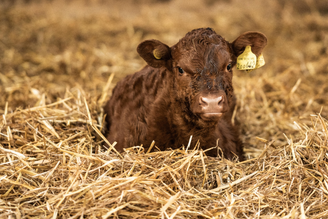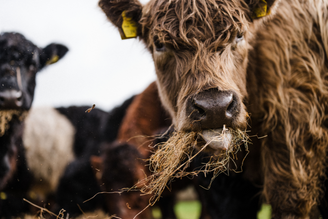Anyone who’s had the pleasure of watching my children argue over which episode of Octonauts to put on will know that, when you’re debating one of life’s big questions, it can be hard to find the common ground.
When it comes to the environment and farming, we live in turbulent times.
Our food system has pushed the natural world, our health and our social structures to the brink. The debate about what we eat and how it’s produced has never raged more fiercely, nor been more important.
Some advocate a farm free future, suggesting that even the word “farm” is one of the most destructive forces ever to have been unleashed on the world. They argue that even ecologically minded animal agriculture is so inefficient that it has no role in the future of food. They would say that farming is, other than burning fossil fuels, the single biggest contributor to climate change and biodiversity loss. In large part, they’d be right.
Others would point out that the UK’s farms produce over 50% of our food, manage 70% of our land and receive less than 1% of GDP in return, and say that it’s unrealistic to expect them to produce food at ever cheaper prices and protect the environment at the same time. They would say that responsible mixed farming has a vital role to play in feeding us and helping to restore the natural world, especially considering the speed with which we must act. They would argue that to focus purely on efficiency, and to separate our food production from the soil and natural systems, might lead us into traps we’ve sprung before. In large part, they’d be right too.
I’ve seen enough debates on the future of food and farming to last less nerdy people a lifetime. And I’ve come to two conclusions. Firstly, that the positions in arguments about meat, land use and new food production technologies are so polarised that no one is going to persuade the other side to cross the aisle. If we wait for that to happen, we’ll be here arguing until the whole thing –quite literally – goes up in smoke. The second is that the two sides in these debates actually agree on most of the things they’re talking about.
Debate is important. It’s the clashing of the stones that causes the spark. But if we are to bring about the necessary changes in our food system, those intelligent and passionate people need to stop shouting at each other about the small number of things they don’t agree on and focus on galvanising action on the bits they do.
So, where’s the common ground?
Well, I’d suggest that one place we could start is in acknowledging that we all need to build a closer connection to our food. To what it is, where it comes from, and to the natural world that enables its production. In short, we need to care more.

We live in a world that actively tries to disconnect us from our food and its impacts. A world of very clever people in white coats formulating products that deliberately divorce us from real food. A world of long and convoluted supply chains and appealingly named farms that exist only as labels on a supermarket shelf. A world where we argue about the merits of regenerative farming while we waste a third of all the food we produce. But we don’t have to accept this. At least not all of it. We can choose something better. And I think that making a conscious effort to connect with food and nature, and to understand the consequences of our choices, is a first step we can all take.

That’s what we try to do with our supper clubs, workshops and events. We are blessed in this part of the world; we live surrounded by farmers and food producers who care about doing things the right way and producing food, as much as possible, in harmony with nature. They don’t pretend to have all the answers, or to get everything right, but they do their best. Building friendships with these people and cooking with their produce is a privilege and a big part of our lives. It shows us every day the power of shorter supply chains, of caring about what you do and of having a true connection to where your food comes from.
When I see Leah, Jake and Martha in their stripped-tilled fields of kale; Joe, Jess and Winnie with their sheep grazing amongst newly planted fruit trees and hedgerows; and Johnny and Ted moving their cattle into a diverse pasture - the kestrel hunting overhead - I see action, experimentation, honesty and hope.
I realise it’s not possible for everyone to have a relationship this direct with our farming system. Building a stronger connection to food and nature will look different for everyone based on location, culture, motivations and means. The inequality of our food system means that, for many, the only food-related issue they can afford to worry about is survival. In the UK, we currently spend £3.9 billion a year on confectionery and £2.4 billion a year on fruit and vegetables. That just can’t be right. And it’s not because people don’t want to value healthy produce. It’s because we’ve created a food system where it costs three times as much to eat healthily as it does to eat ultra-processed food.

That said, any start is a good one. We can simply read the ingredients and nutritional information on one of our favourite products, try a new recipe, eat a new vegetable, grow something, ask some questions in a shop or spend a few minutes listening to the birds (shout out to the life changing Merlin Bird ID app!) It sounds hokey, but it can just be going out, picking a few stinging nettles and cooking them.
Turning weeds into free, healthy food can go a long way in helping us to see ourselves as part of nature and not apart from it.
We’ll never all agree on the respective roles that farms and new technologies should have in the future of our food system. The ethical, cultural and practical positions are too entrenched. Coming from a farming family, I have my own baggage. I think that responsible, progressive mixed farming has an important role to play in the future of our food and environment. At the very least, the deep cultural connection we have with traditional farming is a powerful force that can be harnessed to drive positive change. Wendell Berry said: “Eating is an agricultural act” and, like it or not, the way we’ve built our world mean’s he’s right.
But things must change. No one knows the right answer, and I’d wager it won’t be all of one thing or all of the other. The challenge is too big, and farming and new technologies will both have valuable roles to play. The sooner we all acknowledge that the better. There’s power in collective action and it’s needed now more than ever. We need to stop vilifying each other, show some humility and find the common ground. We need to connect with our food, connect with each other and crack on.
Hopefully that’s something that all of us – even my kids – can agree on.

Words: Will Norton, @will_rootle
Pictures: Louise Eleanor Photography @louiseeleanorphotography
Follow @rootle_ where you'll find details about Supper in the Stables on the Flete Estate, Devon, and other events that connect people with their food and with sustainably-minded farmers and producers.


